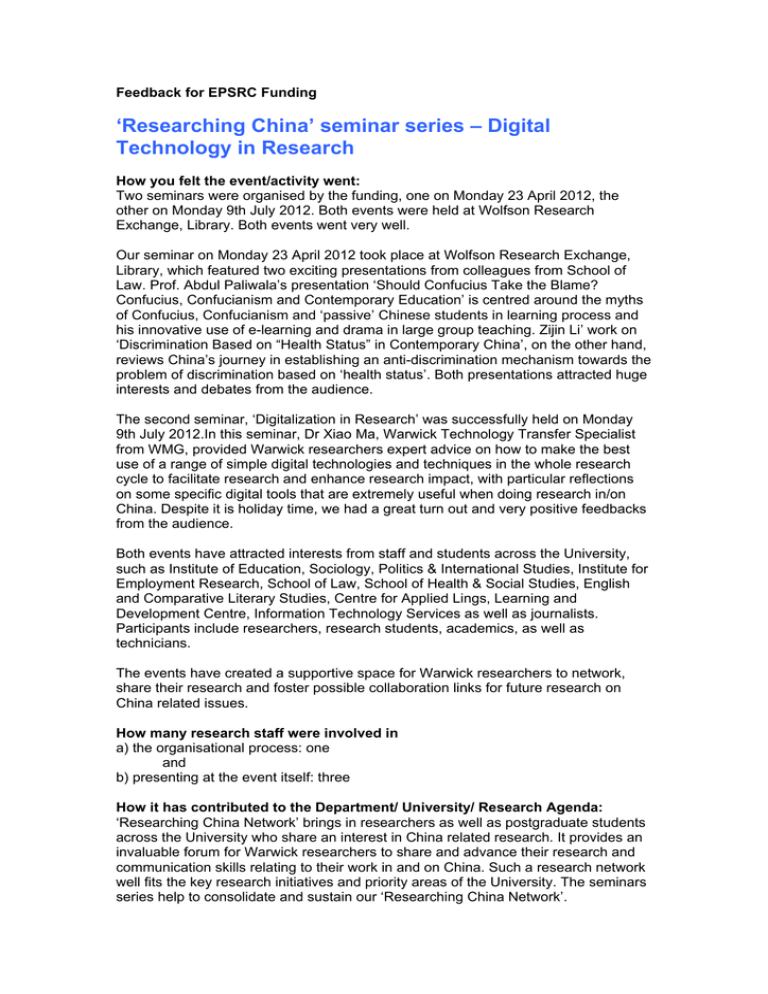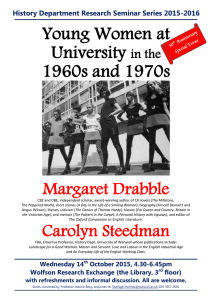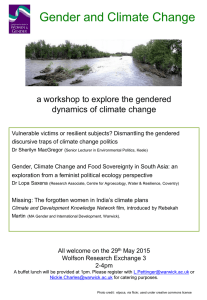‘Researching China’ seminar series – Digital Technology in Research
advertisement

Feedback for EPSRC Funding ‘Researching China’ seminar series – Digital Technology in Research How you felt the event/activity went: Two seminars were organised by the funding, one on Monday 23 April 2012, the other on Monday 9th July 2012. Both events were held at Wolfson Research Exchange, Library. Both events went very well. Our seminar on Monday 23 April 2012 took place at Wolfson Research Exchange, Library, which featured two exciting presentations from colleagues from School of Law. Prof. Abdul Paliwala’s presentation ‘Should Confucius Take the Blame? Confucius, Confucianism and Contemporary Education’ is centred around the myths of Confucius, Confucianism and ‘passive’ Chinese students in learning process and his innovative use of e-learning and drama in large group teaching. Zijin Li’ work on ‘Discrimination Based on “Health Status” in Contemporary China’, on the other hand, reviews China’s journey in establishing an anti-discrimination mechanism towards the problem of discrimination based on ‘health status’. Both presentations attracted huge interests and debates from the audience. The second seminar, ‘Digitalization in Research’ was successfully held on Monday 9th July 2012.In this seminar, Dr Xiao Ma, Warwick Technology Transfer Specialist from WMG, provided Warwick researchers expert advice on how to make the best use of a range of simple digital technologies and techniques in the whole research cycle to facilitate research and enhance research impact, with particular reflections on some specific digital tools that are extremely useful when doing research in/on China. Despite it is holiday time, we had a great turn out and very positive feedbacks from the audience. Both events have attracted interests from staff and students across the University, such as Institute of Education, Sociology, Politics & International Studies, Institute for Employment Research, School of Law, School of Health & Social Studies, English and Comparative Literary Studies, Centre for Applied Lings, Learning and Development Centre, Information Technology Services as well as journalists. Participants include researchers, research students, academics, as well as technicians. The events have created a supportive space for Warwick researchers to network, share their research and foster possible collaboration links for future research on China related issues. How many research staff were involved in a) the organisational process: one and b) presenting at the event itself: three How it has contributed to the Department/ University/ Research Agenda: ‘Researching China Network’ brings in researchers as well as postgraduate students across the University who share an interest in China related research. It provides an invaluable forum for Warwick researchers to share and advance their research and communication skills relating to their work in and on China. Such a research network well fits the key research initiatives and priority areas of the University. The seminars series help to consolidate and sustain our ‘Researching China Network’. The network events helped increase the impact and visibility of Sociology Department across the University and beyond. It demonstrates the dynamics of research in Sociology as a host Department as well as its encouraging research environment for early career researchers. The network will foster further collaborative projects which will have great impact on the research and career development of early career researchers at Warwick. What has been learnt: Organising and running the network and its events also helped to improve my management and communication skills, advance my networking and teamworking skills as well as strategic planning and marketing skills, which are all important transferable entrepreneur skills. I have to organize the events amid other teaching and research activities. I have learned to strategically plan the events, choose the most appropriate presenters and topics, coordinating with other departments across the University. I have learnt to use new digital technologies to facilitate the organizations of the events. For example, our second event was publicised through ‘Eventbrite’. I have also learnt how to deal with emergencies during an event. Organizing the events also enable me to establish research links and networks with other researchers from across the University, which would have great impact on the further development of my research and career. What would be done differently next time: Lunch time seminars can enable more staff/students to come and can attract more audience as they are compact. However, sometimes it can make people feel rushed and couldn’t engage in more in-depth communications. We had planned different activities and games to foster in-depth communications. However, we couldn’t put them in to practice due to time restrictions. If we have funding for future events, maybe we could organize some events with a less formal format and give participants more time networking. Impact/results/benefits: Staff/students from more than ten departments across the University have attended the Network events. After the two events, our network members almost doubled. A range of media, including posters and postcards, emails, online booking sites, Researching China Network event website as well as Eventbrite were used to increase the publicity and impact of the events, which has a great result. The network and events have attracted interest from a variety of audiences across the University and beyond. Researching China Network has becoming a first point of consultation and contact for Warwick researchers and research students and beyond on China related research. I have, for example, been contacted by Warwick Art Centre to present at their future events on China related talks. Warwick researchers and students have made use of the network to support their China related research. For example, the network has been answering enquires from Warwick researchers and research students and has facilitated them and put them into contact with other researchers on the network.



